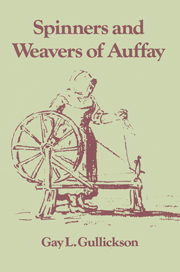 The Spinners and Weavers of Auffay
The Spinners and Weavers of Auffay Book contents
- Frontmatter
- Contents
- Preface
- 1 Introduction
- 2 The pays and the village
- 3 Proto-industrial theory and the pays de Caux
- 4 The golden age of spinning
- 5 Crisis and change in the Caux
- 6 The golden age of cottage weaving
- 7 Marriage and family in proto-industrial Auffay
- 8 Widowhood, remarriage, and the sexual division of labor
- 9 Unwed mothers and their children
- 10 Conclusions: the causes and consequences of proto-industrialization
- Appendix Vital statistics for Auffay
- Notes
- Bibliography
- Index
5 - Crisis and change in the Caux
Published online by Cambridge University Press: 29 October 2009
- Frontmatter
- Contents
- Preface
- 1 Introduction
- 2 The pays and the village
- 3 Proto-industrial theory and the pays de Caux
- 4 The golden age of spinning
- 5 Crisis and change in the Caux
- 6 The golden age of cottage weaving
- 7 Marriage and family in proto-industrial Auffay
- 8 Widowhood, remarriage, and the sexual division of labor
- 9 Unwed mothers and their children
- 10 Conclusions: the causes and consequences of proto-industrialization
- Appendix Vital statistics for Auffay
- Notes
- Bibliography
- Index
Summary
Revolution
By the winter of 1788–89, the French monarchy was in serious financial trouble and embarked on a series of fateful decisions. Having failed to convince the parlements to register edicts that would have levied taxes on the nobility, the king ordered a meeting of the Estates General, announced procedures for electing delegates, and requested people meet by village, order, and occupation to compile lists of grievances. The peasants, artisans, and merchants of Rouen and the Caux held meetings, elected representatives to regional assemblies, and wrote their cahiers de doléances. The major concerns of the cauchois peasants and artisans were not, however, the kingdom's finances and the struggle taking shape over the national government, but their need for economic aid. Unfortunately for Louis XVI, as well as for the Caux (at least in the short run), the government was rapidly losing its ability to help itself, much less anyone else.
The problems in the Caux had begun earlier in the decade, when English textiles began to eat into the foreign market for French textiles. They did not become truly serious, however, until 1786, when an Anglo—French commercial treaty allowed English fabric to be sold in France itself. Commonly called the Eden Treaty after the chief English negotiator, William Eden, whose preparations for the meetings allowed him to outmaneuver the French at every step, the treaty was greeted with dismay by French manufacturers.
- Type
- Chapter
- Information
- The Spinners and Weavers of AuffayRural Industry and the Sexual Division of Labor in a French Village, pp. 86 - 107Publisher: Cambridge University PressPrint publication year: 1986


